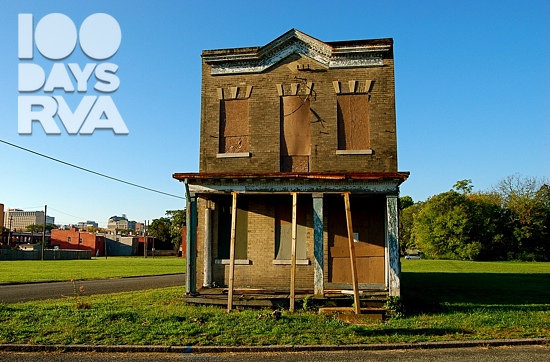Day #058: Tax land, not property
Why tax productive behavior when taxing humanity’s land has so many benefits?

Inspired by Michael Bierut’s 100 Day Project, 100 Days to a Better RVA strives to introduce and investigate unique ideas to improving the city of Richmond. View the entire project here and the intro here.
- Idea: Favor taxing land instead of improvements for real property taxes in Richmond.
- Difficulty: 4 — Virginia has authorized municipalities to use two-rate property taxes which is important in a Dillon Rule state, but legislating and executing significant tax changes is difficult.
In 2007, Matthew Freeman wrote a great post on his blog Urban Richmond called “Good Idea #2: Tax land, not buildings.” What Freeman is advocating for is called a Land Value Tax (LVT), and it’s used in countries like Denmark and Jamaica as well as many municipalities in Pennsylvania.
Property taxes in Richmond are broken down into two parts:
- The value of land
- The of improvements made to the land
The city taxes both of these assessed values at $1.20 per $100 of value1 per year.
LVT originated with Adam Smith but gained popularity through Henry George during the Populist Movement. One of George’s main arguments was strictly philosophical. Land is the common property of all humanity, and in order to use it individuals need to pay rents on the unimproved value that benefit all of society. The tax needs to be sufficiently high to provide schools, infrastructure, and services for the common good.
There are even stronger logical arguments. Taxes increase the cost of productive behavior. They drive a wedge between the demand price and supply price which decreases quantity and creates deadweight loss. This is not true of the land value tax because the tax is levied regardless of production.
By taxing improvements, the government is encouraging land speculation while creating disincentives to development. By taxing land at a higher rate and not taxing improvements, the city could generate identical revenue while encouraging owners holding on to property for speculative reasons or for parking lots to improve or sell.
There are many benefits to LVT, here are a few that would specifically benefit Richmond:
Decreases Sprawl
Land value taxes encourage the development of properties that are held for land speculation. This shifts demand to the redevelopment of unused properties while decreasing urban sprawl.
This urban in-fill would be huge for Richmond. In Harrisburg Pennsylvania, a land tax six times higher than the improvement tax is credited (by policy makers who instituted the LVT) with reducing vacant properties from 4,200 in 1982 to less than 500.
A highly progressive tax
Land value taxes are highly progressive taxes that would be mostly assessed on the wealthy while decreasing inequality. Favoring an even higher land value tax to the meals tax would lessen the burden on lower income individuals while promoting consumption. Taxing “luxury goods” like meals sounds progressive, but lower income individuals disproportionately benefit from restaurant employment.
Less Bureaucracy
When used to remove income taxes, inheritance taxes, capital gains taxes, and value added taxes, the simple LVT limits bureaucracy. This is less relevant in Richmond, but limiting assessments to one factor and reducing the burden on other sources of revenue (law enforcement, fees, etc.) would be hugely beneficial.
— ∮∮∮ —
This type of change can’t happen overnight. The city should announce the change five years in advance because property decisions are made on an extended time line. After five years, they should start shifting the weights of property taxes by gradually increasing the amount on land value and decreasing the amount on improvements. A pure LVT may not be the answer, but a gradual change would disincentive speculation while incentivizing productive behavior.
The city could also instead decide to use LVT in specific areas as an alternative to tax abatements. The city now allows for partial tax exemptions in certain neighborhoods. The process is tedious for property owners and requires additional man hours from the city. A LVT system would accomplish the same goals without having to approach improvements on a case by case basis. Freeman recommends using it in a small zone specifically for increasing density.
It’s surprising how little is known about land value taxes despite incessant calls for tax reform and code simplification from both sides of the aisle at all levels of government. Richmond should still diversify it’s revenue streams, but a Land Value Tax could limit the number of vacant properties and parking lots for the sake of speculation while encouraging essential development.
Love this idea? Think it’s terrible? Have one that’s ten times better? Head over to the 100 Days to a Better RVA Facebook page and join in the conversation.
Photo by: taberandrew
- The mayor recently suggested decreasing this amount to $1.19. In 1980, the amount was $2.12 but it has steadily decreased since then. ↩
-
Recommend this
on Facebook -

Report an error
-

Subscribe to our
Weekly Digest





There are 6 reader comments. Read them.